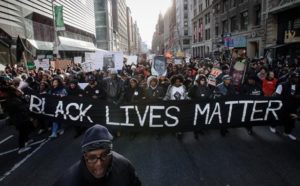
The new lawsuit accuses Black Lives Matter of inciting and encouraging violence at their rallies and protests. (Image courtesy of Wikipedia Commons)
A lawsuit filed in federal court in Louisiana last week claims Black Lives Matter and several of its leaders are to blame for the ambush on police that left three officers dead and three more injured in Baton Rouge last year.
In the complaint, filed Friday, July 7, an unidentified Baton Rouge officer accuses Deray Mckesson, Johnetta “Netta” Elzie and three other prominent members of the Black Lives Matter movement of inciting and encouraging violence at nationwide protests. Moreover, the suit alleges that the “militant, anti-police organization” and the rhetoric of its leaders are what inspired decorated former Marine sergeant Gavin Long, 29, to unleash multiple rounds of gunfire on Baton Rouge police on July 17, 2016.
Among those injured in the barrage of bullets was the plaintiff, who is identified only as “Officer John Doe Smith” in the lawsuit.
“At least eleven police have been shot dead and at least nine more wounded by Black Lives Matter protesters, activists, and/or supporters,” the complaint alleges. “The leaders of BLM and the Defendants not only incited the violence against police in retaliation for the deaths of Black men shot by police but also did nothing to dissuade from the ongoing violence and injury to police. In fact, they justified the violence as necessary to the movement and war.”
The unnamed officer, a 42-year-old father of two who served on the force for more than 18 years, claims he was left “permanently disabled” after being shot in the abdomen, through his left shoulder and on the left side of his head during Long’s calculated attack. The shot to his abdomen “tore up his intestines,” the complaint states, and required the injured officer to undergo more than 16 surgeries.
The lawsuit seeks at least $75,000 in compensatory damages.
Long’s deadly attack came less than two weeks after a white Baton Rouge police officer fatally shot Alton Sterling, a 37-year-old Black man who was selling CDs outside a local convenience store. One day later, another Black man, Philando Castile, was fatally shot during a police traffic stop in Falcon Heights, Minn.
The back-to-back shootings spurred Black Lives Matter protests across the nation, including a peaceful one on July 7, 2016 in downtown Dallas, Texas. The peaceful protest took a turn for the worst, however, when Army veteran Micah Johnson ambushed officers assisting with the demonstration route. The attack left five Dallas officers dead and seven others injured.
Ten days after the Dallas shooting, Long traveled to Baton Rouge to carry out his retaliatory attack on police there. The new complaint argues that the gunman’s attack might not have happened if BLM didn’t incite “disdain, hatred and violence against police” at their protests, on social media and in media interviews. It goes on to suggest that BLM encouraged Long’s violent behavior, as he took a trip to Dallas days after the ambush there before heading to Baton Rouge.
In a suicide note, the gunman wrote that he felt compelled to “bring the same destruction that bad cops continue to inflict upon [Black] people, upon bad cops, as well as good cops in hopes that the good cops (which are the majority) will be able to stand together to enact justice and punishment against bad cops,” The Washington Post reported.
The new lawsuit blames Mckesson and others named in the suit for the officer’s injuries, stating, Officer John Doe Smith “was shot in an ambush of law enforcement officers … by an activist whose actions followed and mimicked those of another BLM activist who killed several officers in Dallas just days earlier.
Mckesson, who was arrested at one of the protests in Baton Rouge last year following Sterling’s death, learned of the new lawsuit through the Associated Press. This is the second time the BLM activist has been sued by a Baton Rouge police officer. Mckesson and other activists also have sued the Baton Rouge police department for excessive force.
“This is quite a world,” McKesson told a reporter.
Other defendants named in the case haven’t yet commented on the lawsuit.


